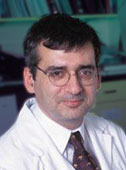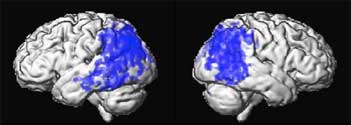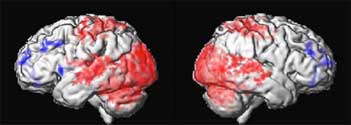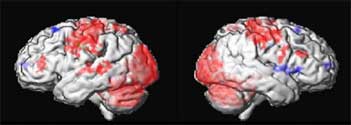Deep Brain Stimulation to Improve the Mind

Andres Lozano
|
Andres Lozano's interest in how the brain works led
him to functional neurosurgery - studying interventions
that can improve function. Well defined areas of the
brain control sadness, hunger, memory, motor and sensory
processing. It is possible to
intervene in the circuits involving
these centres, using electricity
- "the currency of the brain"
to turn off or suppress electrical
function. For example, it is
possible to interrupt the epilepsy
circuit, stopping the disorder.
Similarly, the discharge
of pain neurons or the 10.000
neurons firing four-five times per second synchronously
to cause Parkinson's tremor can be interrupted.
Andres studied under Ron Tasker, the world authority
on intervention for Parkinson's disease. Following on the
success of deep brain stimulation (DBS) in Parkinson's
disease, depression has become the next frontier. Area 25
is the sadness centre. When it is in overdrive, evidenced
by uptake of radioactive water on a PET scan, the patient
is depressed. DBS turns this area down, improving mood.
Of 45 patients studied so far, 2/3 were improved.
Tom Insell, who as director of the National Institute
of Mental Health enjoys an unparalleled view of the discipline,
says "People often ask me about the significance
of small first studies like this. I usually tell them: "Don't
bother. We don't know enough."
But this is different.
Here we know enough to say this is something significant.
I really do believe this is the beginning of a new
way of understanding depression."
The study has now moved on to phase III, with 200
patients to be enrolled. All are patients who have failed
to improve on drug or electroconvulsive therapy. The
study will be carried out in 18 centers throughout North
America. The design includes insertion of the electrodes
in all patients. Half will be turned on immediately and
half will be delayed for six months.
There have been over 80,000 patients treated by DBS
for Parkinson's disease. Every major neurological centre can carry it out,
so it would be easy to adapt their systems
to intervene in area 25. Unlike the relatively rare
diseases treated by neurosurgeons in the past, such as
subarachnoid hemorrhage or brain tumours, depression
is a common disease. 9% of females and 6% of males
are depressed. Of this number, 10-15% are treatment
resistant.
These studies led Andres and his colleagues to feel that
they are "like space explorers, entering uncharted areas
of the brain. Interestingly, there is the same number of
neurons in the brain as there are stars in our galaxy. The
human brain is the greatest mystery on earth."
Andres has 100% congruence between his clinical
and laboratory interests. In his very active lab, PhD students
are studying the effects of DBS at the cellular and
molecular level. Since there are known appetite centers
in the hypothalamus that have been surgically ablated to
destroy hunger, he was asked to try electrical stimulation
in treatment resistant morbidly obese patients. During
DBS, an obese 53 year old man was asked: "Are you
hungry?" An electrode had been advanced into his brain
to identify a target where stimulation has an effect in
suppressing appetite. However, he experienced a "deja
vue" sensation. He said: "I feel like I am 25 years old.
I am with my girlfriend, hearing the sounds I heard 33
years ago". Now, 3 or 4 months later, the same patient
has had a dramatic improvement in his verbal memory.
This serendipitous finding precipitated an attempt to
improve the memory of 6 Alzheimer's disease patients
- by stimulating the memory circuit. In this Phase 1
study, the PhD project of neurosurgery resident Adrian
Laxton, there was some improvement of memory and
it was clear that the intervention could be done safely.
The study is now moving on to Phase II. Neurosurgery
resident and PhD candidate Scellig Stone has extended
these observations and has shown in the laboratory that
this stimulation creates more neurons in the hippocampus
in animals. The mice become smarter i.e. better at
running mazes. Despite years of study, it appears that
the characteristic amyloid deposits in Alzheimer's disease
(AD) patients' brains are not the entire story. So far
clearance of amyloid doesn't improve memory in AD
patients and normal people can have amyloid without
impairment. In Parkinson's disease there is no
|
increase in cells (neurogenesis) by deep brain electro stimulation,
but the performance of the circuit is improved. There
are apparently areas of the brain that are shut down,
but can be recovered as evidenced by reestablishment of
glucose utilization in the silent areas. "The lights are out,
but someone's at home". In Parkinson's disease, there is
no increase in neurons. New neurons are generally not
generated except in the olfactory system and in the hippocampus.
"The biggest advances in science are made by questioning
dogma. The fundamental belief of science is that
facts change. Neurosurgeons have access to the human
brain, they are uniquely privileged to be able to study
and improve its function."

Decreased metabolism in AD compared to controls

One month of DBS compared to baseline

One year of DBS compared to baseline
Positron emission tomography scans of 6 patients with Alzheimers disease
showing areas of decreased glucose utilization before surgery in
blue which are reversed with DBS after 1 month or 12 months of DBS.
Restoring glucose utilization suggests that these brain areas that were shut
down are once again active.
Q: What is your typical day like?
A: "I operate in 2 week blocks, alternating with Dr.
Mojgan Hodaie - two weeks in the lab, followed by two
weeks of clinical responsibility. There are 3 days of operating
in each clinical week. I write and do experiments
during the laboratory week. This works out well 90%
of the time. I write everyday and everywhere, but finish
papers in uninterrupted time." Dr. Hodaie, who was his
resident and fellow, is now his colleague with her own
very active research program.
Q: What is Neuroethics?
A: This work introduces a new set of ethical challenges,
for example: 1. The competence of subjects to consent
despite psychological or cognitive illness. 2. The question
of change in personality. Certainly there could be a dark
side to this, but change in personality is unequivocally
accomplishable. 3. Enhancement. Since obese patients'
memory is definitely enhanced as an unintended side
effect, the question now is should DBS be offered to
improve normal memory? Patients are now requesting
this intervention.
There is an international society of stereotactic and functional
neurosurgeons. Andres has served as president.
There are 500 neurosurgeons in the world doing this
work which is not strictly limited to neurosurgeons. It is
a multidisciplinary field involving engineers, psychologists,
neurologists and others.
Andres' wife Marie is a neurologist. They have two
boys, Christopher in the 10th grade and Alexander in
the 12th grade. Alexander has become fascinated with
scientific discovery. He had an epiphany on a Take Your
Child to Work Day when he learned in the lab that
science is not simply learning what is already known,
but more importantly generating knowledge about
the things we don't know. Quoting Yeats, Andres says
education should light a fire, not fill a bucket. He is
happiest when he is discovering and helping patients.
When asked about assuming the role of the Chair of the
Neurosurgery Division, he stated that it is an honor to
lead what has arguably become the leading neurosurgery
division in the world. The challenge is to take it upward
from its current exceptional status. "You can't find a better
group of residents and faculty".
M.M.
|